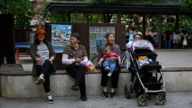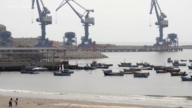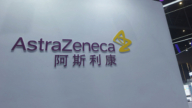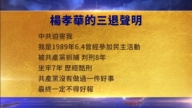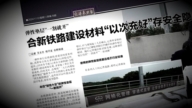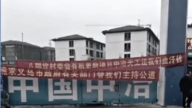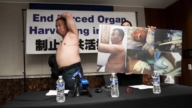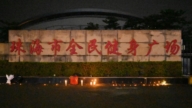【新唐人2011年9月7日讯】美国前副总统切尼在最近出版的《我的岁月:个人及政治回忆录》里,谈到了他与中共总书记胡锦涛的两次会谈经历。切尼发现,他原本希望能与胡锦涛轻松的进行“一对一”谈话,但都被中方有意无意的搅散。评论人士认为,在中共体制下,即使贵为总书记、一把手,也不会有自己真正的自由,真正的想法。
《美国之音》披露了切尼的回忆录。在他的回忆录中,切尼提到,他和胡锦涛的第一次对话发生在2002年胡锦涛访美期间。当时胡锦涛是国家副主席,但接班地位已经是众所周知。
切尼在回忆录里写道,他邀请与胡锦涛进行一对一的会谈,希望在轻松的环境下,胡锦涛不要说一些照本宣科的官话。
不过,当时时任中共外长的李肇星忽然闯入,坐在他和胡锦涛之间,并且拒绝离开。切尼认为,李肇星这样做的目地显然是要监督胡锦涛的言行,然后向北京报告。
香港《动向》杂志主编张伟国认为,胡锦涛其实是被党机器的绳索牵着走。
张伟国:“切尼这个细节、证据,惟妙惟肖的刻画了胡锦涛作为共产党最高领导人,其实也只不过是一个党的统治工具而已。另外一方面,也证实了一个,原来的前外交部长李肇星,他的这种专横跋扈,他不仅在外交上,在中共高层的权力过程当中介入很深,也是充当了一个重要的角色。”
切尼2004年访问北京期间,与胡锦涛又进行了第二次的私人对话。即使当时已经是国家主席的胡锦涛,与切尼交谈的过程,却在隔壁房间被“现场直播”。这次经历,最终导致切尼再也提不起兴致与胡锦涛进行私人对话。
中国民主运动海外联席会议主席魏京生认为,外国领导人以为和中国领导人打交道,可以私下里进行坦率的交谈,交流意见,这在中国的政治现实下,是不可能的。
魏京生:“按照共产党的性质,和共产党一般和外国打交道的惯例来说,基本上不可能跟中国的领导人建立什么私人关系。有的话也只能是国家和国家、政党和政党的关系。倒不是他们个人不喜欢,他们的惯例,他们的那种专制政治本身就不允许,没有你个人的人格,你完全是党和国家的机器。”
在《九评共产党》书中提到,共产党员普遍具有双重人格特征。在私下场合,共产党员多具有普通的人性,具有一般人的喜怒哀乐,他们或许是父亲,或许是丈夫,或许是好朋友,但凌驾在这些人性之上的,则是共产党最为强调的党性。而党性,按照共产党的要求,永远超越普遍人性而存在。
即使贵为中共总书记的胡锦涛,在他成长的江苏泰州,也有过一段不堪回首的伤心往事。“文革”期间,他的父亲胡静之被造反派诬告“贪污公款”,并且被批斗惨死。伤心的胡锦涛为父亲奔丧,甚至还请客请求当地政府为父亲平反,但受到了冷遇。
叶科(南加州大学公共政策博士):“所以它(共产党)除了搞政治运动,它不可能把这个国家带上一个非常健康的发展的道路,所以,我想,也非常希望胡锦涛他自己能看到这一点,他经历了这么多,可是他在这个体系内基本是战战兢兢,如履薄冰,所以这么多年,人们没有看到他有任何大的作为。”
叶科指出,胡锦涛现在是中共最高的权力拥有者,希望他能拿出魄力来,改变中国现状。如果胡锦涛还继续维护共产党,等于把自己跟中共绑在了一起,未来也将会以惨淡收场。
新唐人记者周玉林、李静、萧宇采访报导。
Cheney’s Private Moments with Hu Jintao
Former U.S. Vice President Dick Cheney recently published
his memoir “In My Time,” in which he mentioned
his two private meetings with China’s President
Hu Jintao. Cheney found that whenever he attempted
to have an informal “one on one” discussion with Hu Jintao,
there were always interruptions by other Chinese officials.
Commentators find that under the Chinese Communist Party
(CCP) system, even the Secretary General as a top leader
cannot really have freedom, or independent thoughts.
Voice of America revealed Cheney’s memoir. In his book,
Cheney mentioned that his first discussion with Hu Jintao
happened during Hu’s visit to the U.S. in 2002. At the time,
Hu Jintao was the Vice President of the Chinese government.
but his status as future president was widely known.
Cheney wrote that he invited Hu Jintao to have a one-on-one
discussion in an informal setting,
so Hu doesn’t have to follow the official protocol rules.
However, the Chinese Foreign Minister at that time
Li Zhaoxing suddenly appeared at the meeting,
sat between Cheney and Hu Jintao and refused to leave.
Cheney believes that Li Zhaoxing was trying to monitor
the words and actions of Hu, then report back to Beijing.
Cheung Wai Kwok, editor of Hong Kong’s Trend magazine
believes that Hu Jintao is been controlled tightly by the CCP.
Cheung Wai Kwok (Editor-in-chief, Trend magazine):
“Cheney vividly portrayed in detail
how the top leader of the CCP, Hu Jintao,
is in fact just another tool used by the party.
On the other hand, this verified
that the former (Chinese) Foreign Minister Li Zhaoxing,
not only influences diplomacy, but was heavily involved
in the political power battles
within the party. , that he also played an important role.”
During Cheney’s visit to Beijing in 2004, he had a second
personal conversation with Hu Jintao.
Even though Hu was already Secretary General of the CCP,
the conversation between the two was “broadcasted live”
from the adjacent room. After these experiences, Cheney
never bothered to have private conversation with Hu again.
Wei Jingsheng, chairman of Overseas Chinese Democracy
Coalition (OCDC) thinks that foreign leaders believe
they can have an open and sincere conversation
with Chinese leaders to exchange views,
but this is not possible under the current
Chinese political system.
Wei Jingsheng (Chairman, OCDC): “Based on CCP’s nature,
and CCP’s general practice in dealing with foreign countries,
it is pretty much impossible to establish
a personal relationship with Chinese leaders.
There can only be relationship between nations
or between political parties.
It’s not that they (Chinese leaders) themselves don’t like it.
The general practice and totalitarian system don’t allow it.
You are not allowed to have your own personality;
you are completely a machine of the party and the state.”
The book “Nine Commentaries on the Communist Party”
mentioned that most CCP members have a dual personality.
In private setting most CCP members act like normal people
with human emotions. They might be a father, a husband,
or a good friend, but covering this human nature
is what the CCP stresses the most, the “party nature.”
This “party nature,” according to the CCP requirements,
must always be placed above one’s human nature.
Even CCP’s current leader Hu Jintao has painful memories
from his early life in Taizhou, Jiangsu province.
During the Culture Revolution his father was accused
of “embezzlement of public fund” and was killed.
Hu Jintao tried to convince the local government to clear
his father of the charges, but his request was ignored.
Yie Ke (PhD, Public Policies, Univ. of Southern California):
“Only good for engaging in political movements,
it (CCP) cannot lead this country
onto a healthy path of development.
For this reason, I believe, and really hope Hu Jintao himself
can see this point after his experiences.
However, he seems to be frightened and very concerned,
after so many years people still don’t see much from him.”
Yie Ke pointed out that Hu Jintao is currently the CCP leader
and expressed hope that he will find the courage to change
the situation in China. If Hu Jintao continues to protect CCP,
it is more like tying himself up to the CCP for a sad ending.
NTD reporters Zhou Yulin, Li Jing and Xiao Yu


